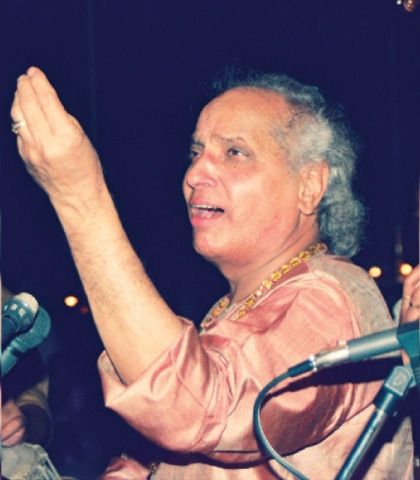
In 1946, Pandit Jasraj (1930-2020) moved to Calcutta, to work at All India Radio. I was born in 1965 and his voice on the radio wafts through all my early memories.
My father, in the first flush of relative financial comfort since travelling to Calcutta from Barisal in Bangladesh during 1947, had brought home a radio. Until I was 26, it was the only technology that offered entertainment in our household.
My father played the sitar and sang north Indian classical. He had a deep disdain for exhibitions of any sort, and seemed to thrive only on minimalism. But he filled our mornings with the Bhairavis and Lalits that the likes of Bhimsen Joshi and Jasraj would sing. By the time I started learning classical music, I was six years old and knew that the dark voice was Bhim’s and the softer one, Jasraj’s.
In 1974, my father pulled a surprise and took the family to our first concert. Stages in those days had few lights. But in the middle sat Jasraj, affable and jocular, conversing freely with the audience as if they were his friends. I remember him as iridescent. I was just learning Raag Yaman, and in a coincidence that children are prone to consider magical, Jasraj sang it too on the day. Listening to him live, my ears opened to a quality of his music that I have believed in to this day.
Even for a vocalist of such renown, a word that must be repeated to describe Jasraj’s unique voice, is ‘sweet’. His renditions were pleasing to the ear, that was the simple truth.
Classical Indian vocalist Pandit Jasraj of the Mewati gharana passed away on August 17. His career spanned some 80 years and his voice brought a touch of divinity to mortal ears
I went on to study Hindustani classical with a singular passion, picking up the flute along the way.
By the time I watched Jasraj live again, it was 1983. A lot had changed. My father had lost his wife, my mother. But the morning radio kept up with its song offerings. I was 18 and the concert was at the Netaji Indoor Stadium in Kolkata. Back then, the Bengal government would organise four-day music festivals that would continue till midnight. Jasraj was the main draw of the day and performed last.
This would be my first brush with an artist’s temperament. Usually, musicians make a brief announcement of what they would sing. He didn’t and instead stared fixedly at a point on stage while the musicians checked the sound.
It was quite late and I had been meaning to leave. Then, suddenly, he broke into song. First, was Raag Bhim Palashree. But he ended it soon and without a single word, began chanting the ancient syllable, ‘Om’. I stood near the door, thinking, “Let me hear this for five more minutes, and then I will leave.”
For the next hour, with just that one syllable, Jasraj travelled at maddening pace through a maze of influences, fusing styles, merging elements and making no bones of the fact that little mattered to him that night other than his own artistic satisfaction. Yet for all the vocal fireworks, the chant retained its sublime essence throughout, renewing itself for the audience each time, yet smoothly travelling through the whole range of all that the Mewat gharana held sacred. I stood near the door the whole hour, transfixed and unable to make any real attempt to exit.
On my way home that day, I did not know that I would not go on to hold fast to my passion for classical music. I did not know that I would listen on the tape recorder to the bhajan Govinda Damodar Madhaveti and marvel — as an atheist — at the divinity that possesses its singer. I did not know that amidst life’s many turns I would sing the same Om Namoh Bhagwatey Vasudevaya under my breath while waiting at the grocery, cooking a meal or making the bed.
But I did know that I had witnessed the work of a singular devotee. White hair billowing around him, with no attention to give to a gaping audience, Jasraj on stage that day took the form of the saint that he is.
His voice was enormous, so enormous that it filled spaces as small as my childhood home with hope. And now the saint has returned to his ashram.
— By arrangement with The Wire, India
The writer is a gold medallist of the 1985 batch of the Bengal Music College
Translated from the Bengali original
Published in Dawn, ICON, August 23rd, 2020













































Dear visitor, the comments section is undergoing an overhaul and will return soon.